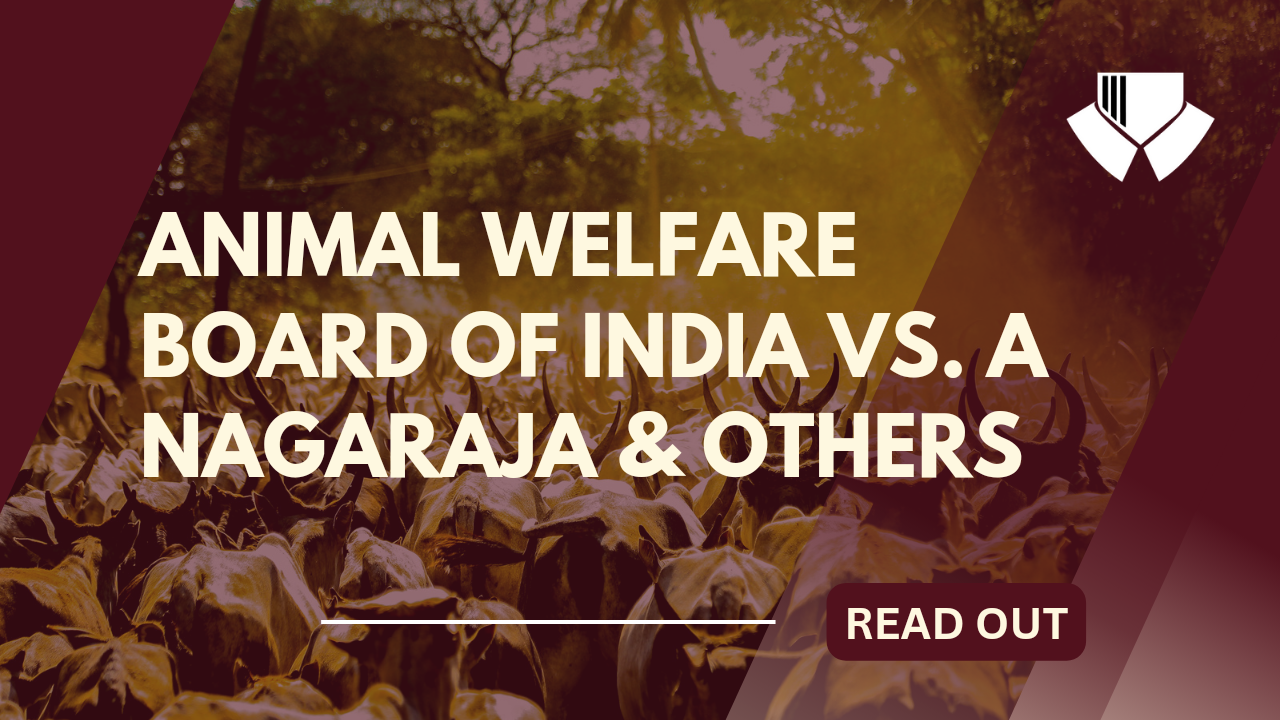This case analysis is written by Shivani Sehrawat, a second year law student at Faculty of Law, University of Delhi.
Citation: Civil Appeal No. 5387 of 2014
Bench: K. S. Radhakrishnan & Pinaki Chandra Ghosh
Date: May 7, 2014
INTRODUCTION
The judgement of the Supreme Court of India in the matter of “Animal Welfare Board of India v. A. Nagaraja & Others” is a milestone in protecting the rights of animals and preventing their use in entertainment activities for human pleasure to ensure the security and dignity of their lives, which is constitutionally recognized.
FACTS
The matter involved the clubbing of numerous civil appeals and a writ petition, as these contained a common issue relating to the involvement of animals in sports activities known as Jallikattu and Bullock-Cart Races in Maharashtra and Tamil Nadu.
ISSUES
- Whether the events that are being conducted in the States of Tamil Nadu and Maharashtra are in violation of Sections 3, 11(1), 21, and 22 of the PCA Act read with Articles 51-A(g) and (h) of the Constitution?
- Whether the provisions of the TNRJ Act, which are a State Act, is repugnant to the PCA Act, which is a Central Act, since both the Acts fall under Entry No. 17 in the Concurrent List?
CONTENTIONS
PETITIONER
- The Petitioner, the Animal Welfare Board of India, took the stand that Jallikattu, Bull/Bullock-cart races, etc. are inherently violative of the provisions of the PCA Act.
- It was argued that even if these activities have any historical, cultural, or religious significance, the PCA Act would supersede them as welfare and Parliamentary legislation.
- It further submitted that bulls are not “performing animals” within the meaning of Sections 21 and 22 of the Act and that the MoEF was justified in issuing the notification banning the exhibition of Bulls or training them as performing animals.
- It was also contended that the TNRJ Act is repugnant to the provisions of the PCA Act and therefore, would not be in force due to the absence of assent from the President.
RESPONDENTS
- The Respondents, comprising the Organizers of Jallikattu and Bullock-cart races, claimed that the events take place at the end of the harvest season and sometimes during temple festivals and have been traditionally and closely associated with village life for more than three hundred years by way of custom and tradition.
- They also contend that extreme care and protection are being taken not to cause any injury or pain to the bullocks who participate in the event, thus not violating Section 11(1) of the PCA Act.
- The Government of Tamil Nadu also argued that Section 22 is not violated as Bulls are “performing animals” and there is no sale of tickets for the events conducted.
DECISION
The Honorable Apex Court, after considering both the Acts, the Notification, the Rules, and the cultural activity with its historical complexes comprehensively, reached the conclusion that the Petitioner is right in its stand that Jallikattu, Bullock-cart Race, and such events per se violate Sections 3, 11(1), and 21 of the PCA Act, declared that Bulls cannot be used as performing animals, either for the Jallikattu events or Bullock-cart Races in the State of Tamil Nadu, Maharashtra, or elsewhere in the country.
ISSUE No: 1
- Jallikattu refers to silver or gold coins tied to the bulls’ horns. It is a sport and not a cultural practice conducted for entertainment, in which people fight with each other to get the money placed around the bulls’ horns.
- Section 3 of the PCA Act, 1960, deals with the duties of persons having charge of animals, which are mandatory in nature, thus conferring corresponding rights on animals. Although the right is violated by the Organizers as they are forcing the Bull and keeping the same in the waiting area for a number of hours and subjecting them to scorching sun and all forms of torture, fear, pain, and suffering, hence, against their well-being, Additionally, by organizing the races, the organizers are inflicting pain and suffering on the bulls, which they are legally obliged to prevent.
- Section 11 prevents cruelty to animals. In Jallikattu, the Bull is expected to fight with various Bull tamers, for which it is incited, thus amounting to cruelty, solely to provide entertainment for the spectators.
- Section 22 restricts the exhibition and training of performing animals without registration. Though Jallikattu Bullock-cart races are conducted without tickets, when bulls are specifically prohibited from being exhibited or trained for performance, the question of whether they are conducted with the sale of tickets or not is irrelevant.
- All animals are not anatomically designed to be performing animals. Bulls are draught and pack animals as they are livestock used for farming and agriculture purposes; therefore, they are rightly recognized as Draught and Pack animals in the Prevention of Cruelty to Draught and Pack Animals Rules, 1965.
- The provisions of the PCA Act have to be read along with Article 51A (g) of the Constitution, which casts fundamental duties on every citizen to have “compassion for living creatures”.
ISSUE No: 2
- The Objects of the TNRJ Act refer to ancient culture and tradition and do not state that Jallikattu has religious significance. On the contrary, the PCA Act is welfare legislation, which thus overshadows or overrides the so-called tradition and culture.
- The TNRJ Act is a State Act and the PCA Act is a Central Act, though both fall under Entry No. 17 in the Concurrent List. Although the Parliamentary legislation will predominate the State Act as it does not have Presidential Assent as required under Article 246 of the Constitution.
- Section 2(c) of the TNRJ Act speaks of the ‘taming of bulls’ which is contrary to the provisions of the PCA Act as it prohibits taming because it causes unnecessary pain and suffering to animals. Similarly, Section 5 of the TNRJ Act envisages a fight between a Bull and Bull tamers; however, this fight is prohibited under Section 11(1) read with Section 3 of the PCA Act.
Henceforth, the provisions of the TNRJ Act are in direct collision with the provisions of the PCA Act thus, declared being unconstitutional and void, being violative of Article 254(1) of the Constitution of India.
CONCLUSION
This judgment is a watershed in ensuring a dignified life for animals while recognizing their certain rights against human endeavors. It would be of great significance in contemporary times as the exploitation of animals by humans is increasing rapidly and widely across the territory just for entertainment purposes.


